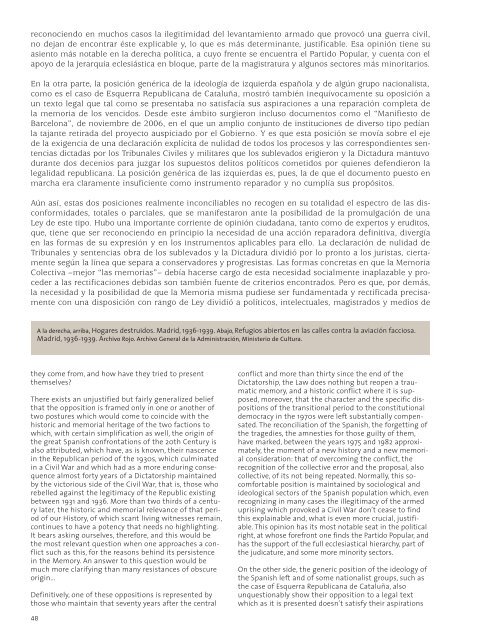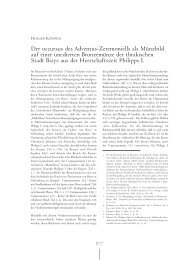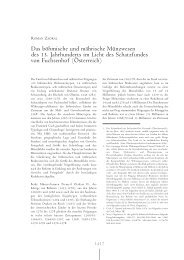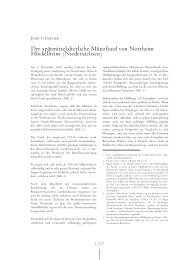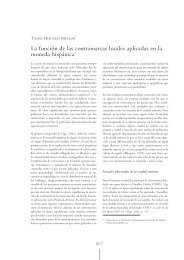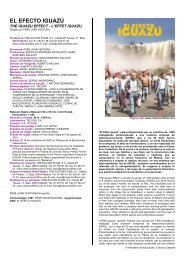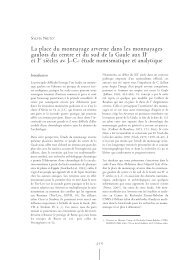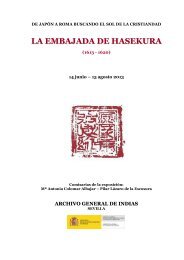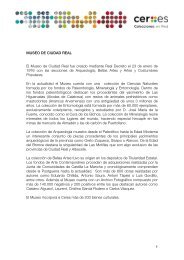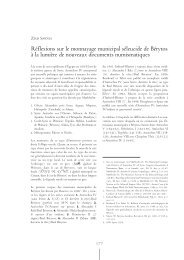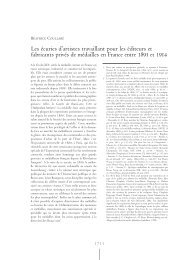La Ley de Memoria Histórica: reparación e insatisfacción Julio ...
La Ley de Memoria Histórica: reparación e insatisfacción Julio ...
La Ley de Memoria Histórica: reparación e insatisfacción Julio ...
Create successful ePaper yourself
Turn your PDF publications into a flip-book with our unique Google optimized e-Paper software.
econociendo en muchos casos la ilegitimidad <strong>de</strong>l levantamiento armado que provocó una guerra civil,<br />
no <strong>de</strong>jan <strong>de</strong> encontrar éste explicable y, lo que es más <strong>de</strong>terminante, justificable. Esa opinión tiene su<br />
asiento más notable en la <strong>de</strong>recha política, a cuyo frente se encuentra el Partido Popular, y cuenta con el<br />
apoyo <strong>de</strong> la jerarquía eclesiástica en bloque, parte <strong>de</strong> la magistratura y algunos sectores más minoritarios.<br />
En la otra parte, la posición genérica <strong>de</strong> la i<strong>de</strong>ología <strong>de</strong> izquierda española y <strong>de</strong> algún grupo nacionalista,<br />
como es el caso <strong>de</strong> Esquerra Republicana <strong>de</strong> Cataluña, mostró también inequívocamente su oposición a<br />
un texto legal que tal como se presentaba no satisfacía sus aspiraciones a una <strong>reparación</strong> completa <strong>de</strong><br />
la memoria <strong>de</strong> los vencidos. Des<strong>de</strong> este ámbito surgieron incluso documentos como el “Manifiesto <strong>de</strong><br />
Barcelona”, <strong>de</strong> noviembre <strong>de</strong> 2006, en el que un amplio conjunto <strong>de</strong> instituciones <strong>de</strong> diverso tipo pedían<br />
la tajante retirada <strong>de</strong>l proyecto auspiciado por el Gobierno. Y es que esta posición se movía sobre el eje<br />
<strong>de</strong> la exigencia <strong>de</strong> una <strong>de</strong>claración explícita <strong>de</strong> nulidad <strong>de</strong> todos los procesos y las correspondientes sentencias<br />
dictadas por los Tribunales Civiles y militares que los sublevados erigieron y la Dictadura mantuvo<br />
durante dos <strong>de</strong>cenios para juzgar los supuestos <strong>de</strong>litos políticos cometidos por quienes <strong>de</strong>fendieron la<br />
legalidad republicana. <strong>La</strong> posición genérica <strong>de</strong> las izquierdas es, pues, la <strong>de</strong> que el documento puesto en<br />
marcha era claramente insuficiente como instrumento reparador y no cumplía sus propósitos.<br />
Aún así, estas dos posiciones realmente inconciliables no recogen en su totalidad el espectro <strong>de</strong> las disconformida<strong>de</strong>s,<br />
totales o parciales, que se manifestaron ante la posibilidad <strong>de</strong> la promulgación <strong>de</strong> una<br />
<strong>Ley</strong> <strong>de</strong> este tipo. Hubo una importante corriente <strong>de</strong> opinión ciudadana, tanto como <strong>de</strong> expertos y eruditos,<br />
que, tiene que ser reconociendo en principio la necesidad <strong>de</strong> una acción reparadora <strong>de</strong>finitiva, divergía<br />
en las formas <strong>de</strong> su expresión y en los instrumentos aplicables para ello. <strong>La</strong> <strong>de</strong>claración <strong>de</strong> nulidad <strong>de</strong><br />
Tribunales y sentencias obra <strong>de</strong> los sublevados y la Dictadura dividió por lo pronto a los juristas, ciertamente<br />
según la línea que separa a conservadores y progresistas. <strong>La</strong>s formas concretas en que la <strong>Memoria</strong><br />
Colectiva –mejor “las memorias”– <strong>de</strong>bía hacerse cargo <strong>de</strong> esta necesidad socialmente inaplazable y proce<strong>de</strong>r<br />
a las rectificaciones <strong>de</strong>bidas son también fuente <strong>de</strong> criterios encontrados. Pero es que, por <strong>de</strong>más,<br />
la necesidad y la posibilidad <strong>de</strong> que la <strong>Memoria</strong> misma pudiese ser fundamentada y rectificada precisamente<br />
con una disposición con rango <strong>de</strong> <strong>Ley</strong> dividió a políticos, intelectuales, magistrados y medios <strong>de</strong><br />
48<br />
A la <strong>de</strong>recha, arriba, Hogares <strong>de</strong>struidos. Madrid, 1936-1939. Abajo, Refugios abiertos en las calles contra la aviación facciosa.<br />
Madrid, 1936-1939. Archivo Rojo. Archivo General <strong>de</strong> la Administración, Ministerio <strong>de</strong> Cultura.<br />
they come from, and how have they tried to present<br />
themselves?<br />
There exists an unjustified but fairly generalized belief<br />
that the opposition is framed only in one or another of<br />
two postures which would come to coinci<strong>de</strong> with the<br />
historic and memorial heritage of the two factions to<br />
which, with certain simplification as well, the origin of<br />
the great Spanish confrontations of the 20th Century is<br />
also attributed, which have, as is known, their nascence<br />
in the Republican period of the 1930s, which culminated<br />
in a Civil War and which had as a more enduring consequence<br />
almost forty years of a Dictatorship maintained<br />
by the victorious si<strong>de</strong> of the Civil War, that is, those who<br />
rebelled against the legitimacy of the Republic existing<br />
between 1931 and 1936. More than two thirds of a century<br />
later, the historic and memorial relevance of that period<br />
of our History, of which scant living witnesses remain,<br />
continues to have a potency that needs no highlighting.<br />
It bears asking ourselves, therefore, and this would be<br />
the most relevant question when one approaches a conflict<br />
such as this, for the reasons behind its persistence<br />
in the Memory. An answer to this question would be<br />
much more clarifying than many resistances of obscure<br />
origin...<br />
Definitively, one of these oppositions is represented by<br />
those who maintain that seventy years after the central<br />
conflict and more than thirty since the end of the<br />
Dictatorship, the <strong>La</strong>w does nothing but reopen a traumatic<br />
memory, and a historic conflict where it is supposed,<br />
moreover, that the character and the specific dispositions<br />
of the transitional period to the constitutional<br />
<strong>de</strong>mocracy in the 1970s were left substantially compensated.<br />
The reconciliation of the Spanish, the forgetting of<br />
the tragedies, the amnesties for those guilty of them,<br />
have marked, between the years 1975 and 1982 approximately,<br />
the moment of a new history and a new memorial<br />
consi<strong>de</strong>ration: that of overcoming the conflict, the<br />
recognition of the collective error and the proposal, also<br />
collective, of its not being repeated. Normally, this socomfortable<br />
position is maintained by sociological and<br />
i<strong>de</strong>ological sectors of the Spanish population which, even<br />
recognizing in many cases the illegitimacy of the armed<br />
uprising which provoked a Civil War don’t cease to find<br />
this explainable and, what is even more crucial, justifiable.<br />
This opinion has its most notable seat in the political<br />
right, at whose forefront one finds the Partido Popular, and<br />
has the support of the full ecclesiastical hierarchy, part of<br />
the judicature, and some more minority sectors.<br />
On the other si<strong>de</strong>, the generic position of the i<strong>de</strong>ology of<br />
the Spanish left and of some nationalist groups, such as<br />
the case of Esquerra Republicana <strong>de</strong> Cataluña, also<br />
unquestionably show their opposition to a legal text<br />
which as it is presented doesn’t satisfy their aspirations


